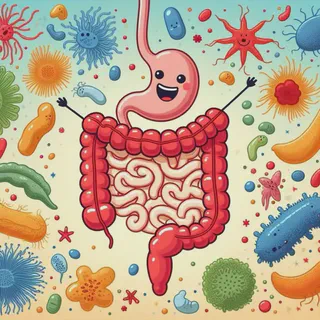This guide shows how sleep and the gut-immune network interact—in a simple timeline, grounded in current research—and gives you a practical plan to restore harmony. If you want the big picture of the microbiome first, start with /the-gut-microbiome-your-bodys-hidden-ecosystem/, then return here for the nightly play-by-play.
A 2,500-Year Timeline: How We Learned Sleep Shapes the Gut
- 400 BCE — Hippocrates observes that natural sleep restores digestion and vitality.
- 1665–1723 — Microscopy reveals the invisible world of "animalcules" (microbes) and early clues that the gut is teeming with life.
- 1950s–1970s — Sleep stages and circadian biology are mapped; nightly hormone patterns (melatonin, cortisol, growth hormone) are linked to repair.
- 1990s–2000s — The human microbiome enters center stage; diet, timing, and light exposure are shown to reshape gut ecology.
- 2010s–today — Studies connect sleep loss and circadian disruption to microbiome changes, intestinal permeability, and immune imbalance. The gut’s microbes also show daily (diurnal) rhythms tied to your light-dark cycle and meal timing.
In short: the gut isn’t just along for the ride at night—it keeps time with you.
What Actually Happens Overnight (Hour-by-Hour)
Think of your evening as a relay where systems hand off to each other on schedule.
- 1–3 hours before bed: Light dims → melatonin rises. The gut’s clock genes begin their night program. Digestion slows; repair pathways prepare. See /chrono-nutrition-timing-meals-optimal-gut-health/ for why meal timing matters.
- Sleep onset: Parasympathetic (rest-and-digest) tone increases. Intestinal motility reorganizes from active processing to maintenance.
- First sleep cycle (NREM): Growth hormone pulses support tissue repair; intestinal epithelial cells tighten junctions and refresh barrier proteins. Learn about barrier integrity in /leaky-gut-syndrome-understanding-addressing-intestinal-permeability/.
- Deep sleep (N3): Peak anti-inflammatory signaling. Microbes shift metabolism, producing short-chain fatty acids (SCFAs) that nourish colon cells and help tune immune balance.
- Later cycles (REM more prominent): Brain–gut crosstalk consolidates; vagal signaling modulates motility and immune surveillance. Nightly patterning sets the tone for morning energy and mood.
When this choreography is consistent—dark evenings, regular sleep, predictable meals—the gut-immune network becomes reliable. When it’s irregular—late lights, erratic meals, chronic stress—microbial rhythms flatten, the barrier struggles, and immune signals become noisy.
Why Sleep Loss Feels Like "Gut Static"
- Microbial rhythm disruption: Sleep loss and circadian misalignment shift the abundance and timing of gut bacteria, including species involved in carbohydrate metabolism and barrier support.
- Barrier stress: Fragmented sleep and chronic circadian disruption are linked with changes in tight junction regulation—your gut’s "gates." When gates are leaky, immune activation and food sensitivities rise.
- Immune drift: Inadequate sleep tilts the immune system toward a pro-inflammatory set-point and dampens regulatory control.
- Metabolic cravings: Short sleep increases appetite signals and alters glucose handling—microbiome changes can amplify cravings for fast carbs the next day.
The good news: these changes are plastic. Consistent sleep can restore rhythmicity and function.
The Practical Blueprint: 14-Day Sleep–Gut Reset
This is a behavioral protocol you can repeat or extend. It complements, not replaces, clinical care. If you suspect deeper gut issues, pair it with /tracking-gut-health-apps-tools-monitoring-digestive-wellness/ and discuss /understanding-gut-health-tests-options-assessing-digestive-wellness/ with your clinician.
Daily Foundations
- Light hygiene: Bright, outdoor light within 60 minutes of waking; dim, warm light 2–3 hours before bed. Reduce blue/bright light after sunset.
- Meal timing: Aim for a 12–14 hour overnight fast most days; finish dinner ~3 hours before bed. See /chrono-nutrition-timing-meals-optimal-gut-health/.
- Fiber diversity: 30+ different plant foods per week to feed a broad microbiome. Start with /fiber-role-gut-health-immunity/.
- Ferments rotation: Include 1–2 servings/day (e.g., kefir, unsweetened yogurt, sauerkraut, kimchi, miso). See /probiotics-beneficial-bacteria-healthy-gut/.
- Stress downshifts: 10–20 minutes evening wind-down (breathwork, prayer/meditation, gentle stretching). See /stress-management-gut-health-stronger-immunity/.
Weeks 1–2: Stepwise Build
- Nights 1–3: Anchor a consistent sleep window (e.g., 11 pm–7 am). Use a warm-light lamp after 9 pm. Swap late-night screen scroll for an analog wind-down routine.
- Nights 4–6: Lock meal timing: last bite 3 hours pre-bed; avoid heavy/fatty dinners on reset days. Hydrate earlier; taper liquids after dinner.
- Nights 7–9: Layer in a 10-minute “parasympathetic cue” before bed: nasal breathing (4-7-8), legs-up-the-wall, or body scan. Keep room cool (17–19°C / 63–66°F).
- Nights 10–14: Add a 15–30 minute dusk walk most evenings. Introduce resistant starch sources at lunch (cooled potatoes/rice, green bananas) to support overnight SCFA production.
Optional Fine-Tuning
- Exercise timing: Earlier is better for sleep. If evenings are your only window, go easy and finish 3+ hours before bed. See /exercise-gut-health-right-balance-digestive-wellness/.
- Anti-inflammatory base: Center dinner on polyphenol-rich plants, omega-3 fish, and extra-virgin olive oil. /anti-inflammatory-diet-gut-health/ and /mediterranean-diet-gut-health-benefits/.
- Gentle support: If appropriate for you, many find magnesium glycinate 1–2 hours before bed helpful. Discuss with your clinician.
Morning Wins: How to Tell It’s Working
- Digestion: More regular, comfortable bowel movements; less bloating.
- Energy: Smoother mornings; fewer mid-afternoon dips.
- Mood: Greater stress resilience, less irritability.
- Sleep: Shorter sleep latency; fewer awakenings.
Track simple daily metrics for two weeks (energy on wake, digestive comfort, mood stability). If improvements plateau, revisit timing, light, and fiber diversity.
Common Roadblocks (And Fixes)
- Late dinners due to schedule: Make lunch your main meal; keep dinner lighter and earlier. Batch-cook fiber-rich soups/stews to simplify.
- Night-time waking at 3–4 am: Audit evening caffeine/alcohol, room temperature, and total daily light exposure. Earlier daylight strengthens the night signal.
- "I’m hungry before bed": Ensure enough protein and fiber at dinner; try a small, balanced snack 3+ hours before bedtime if you’re active.
- Shift work: Prioritize a fixed sleep window on workdays, strict light control, and pre-sleep routine. Anchor meals to your main sleep period.
Your Evidence-Based Link Map (Start Here)
- Microbiome basics: /the-gut-microbiome-your-bodys-hidden-ecosystem/
- Gut–brain axis: /the-gut-brain-axis-how-your-digestive-system-affects-your-mind/
- Leaky gut overview: /leaky-gut-syndrome-understanding-addressing-intestinal-permeability/
- Anti-inflammatory eating: /anti-inflammatory-diet-gut-health/
- Mediterranean template: /mediterranean-diet-gut-health-benefits/
- Fiber primer: /fiber-role-gut-health-immunity/
- Probiotics 101: /probiotics-beneficial-bacteria-healthy-gut/
- Tracking progress: /tracking-gut-health-apps-tools-monitoring-digestive-wellness/
Key Takeaways You Can Act On Tonight
- Dim lights 2–3 hours before bed; keep your wake-up light bright and consistent.
- Finish dinner ~3 hours before sleep; keep a 12–14 hour overnight fast.
- Feed your microbes with plant diversity and daily ferments.
- Give your nervous system a nightly cue that it’s safe to power down.
- Repeat for 14 nights; adjust based on your data.

